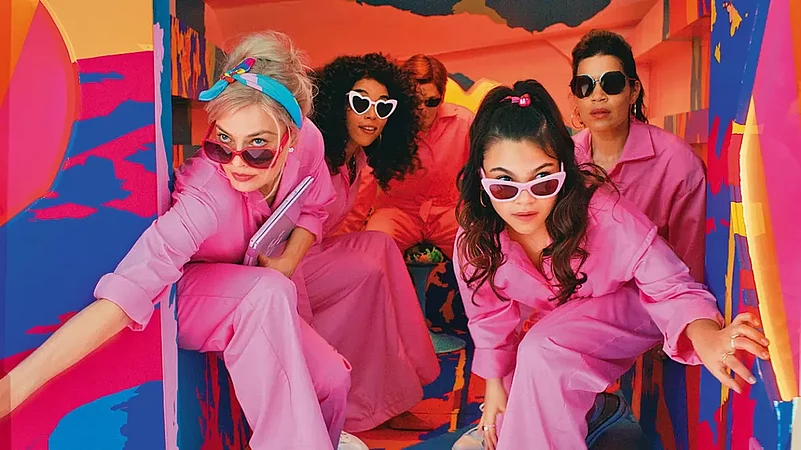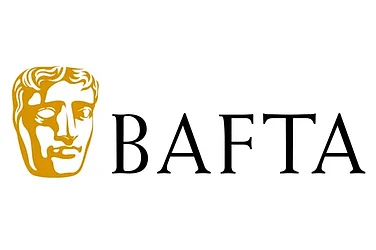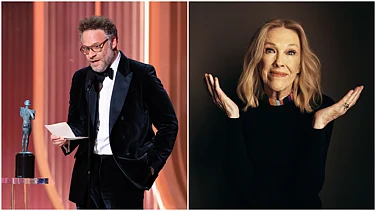My three-year-old daughter is running around the Khan Market parking lot —upset at me for denying her a Barbie doll set— while my friend is chasing her. More than a decade later, this remains my friend’s favourite memory of her. He uses it sometimes to tease her and the discussion inevitably veers towards how I am a mean mom.
I watched Greta Gerwig’s Barbie — first day, first show. I wore ripped shorts, a crumpled T-shirt and my latest Birkenstocks. This turnout was purely circumstantial as I had driven twenty-five kilometres to drop my teenager at school before going to watch the film. I was, clearly, a part of the non-pink crowd. Yet, I —a daughter of third-wave feminism— am the biggest cheerleader of Barbie, the film.

What is there to not like about a film that is so self-referential and pokes fun at everything that we seem to have taken too seriously? That uses all the familiar tropes of feminism and patriarchy and turns them into Brechtian agitprop? A film that is, most importantly, so entertaining as a cinematic experience it makes one’s heart feel dizzy? The last reason alone should be enough to like any film but, clearly, it is not. Every bit of the film, the filmmaker and the filmmaking process needs to be dissected and found flawless to be able to appreciate cinema these days. Else, you are accused of making an uninformed choice.
What is there to not like about a film that is so self-referential and pokes fun at everything that we seem to have taken too seriously?
Ah, the elusiveness of choice! Brown Birkenstock Arizonas or burnished-pink Louboutin Pumppies (at least that’s what they looked like)—Gerwig’s Barbie proposes that the binary is here to stay and the only way to negotiate it is to simply not care for anything except one’s feet. It’s all about the feet, after all, and the ground beneath them. The two turning points in Stereotypical Barbie’s journey are about her feet. She needs her feet to be comfortable. The two revolutions in Barbieland—first by the neglected and irrelevant Kens and then by the equally irrelevant Barbies—are to reject the discomfort of being pushed to the margins. In both situations, there is no equal ground beneath their feet that can allow them to stand tall as they are. In an unequal world, respectively marginalised Kens and Barbies are not enough, and will never be, for each other. To extend the footwear metaphor, wearing an Arizona on one foot and a Pumppie on the other is not wise.

Let’s start with Barbie’s feminism, wokeness et al. The Barbieland feminist Utopia, America Ferrera’s spiel and Ken’s representation of mass ‘emasculation’ under feminism have been the most hotly debated points about the film. Viewers and critics have either loved them for making a strong point or hated them for being too unsubtle and laboured. But what is Gerwig doing, really, if not questioning this very debate? Republicans in the US have gone to hilarious heights to lambast the film for its ‘wokeness’, thus, falling into the trap that Barbie set and further exposing their commitment to inequality, the core of their politics.
I hate to state the obvious, but maybe because so many people have missed the point I must swallow my ego and say the needful: the only politics that Barbie has is the uber-radical idea that inequality is bad and has catastrophic ramifications. We have been reading and hearing and watching this idea unfold in different spatio-temporal contexts for centuries and yet it is lost on most. Gerwig knows that. And Mattel knows it, too. This film placed its bet, rightly, on heightened emotions trumping unbiased critical examination. Barbieland’s Utopia is an unequal land where Kens have no agency. Deja vu! Where have we seen a similar world before?
Gerwig’s Barbie brings together all strands and applications of the equality discourse in an immensely watchable film. The demand that she should have pushed the envelope a little more and created something edgier is a manifestation of inequality. Why should a woman filmmaker, making an allegedly ‘women’s film’ be benchmarked differently? Ferrera’s character voicing the demand for an Ordinary Barbie by the end of the film is Gerwig herself asserting her right to be not extraordinary all the time and still be respected. To make her stance clear, she has used all the filmmaking tropes that won laurels for her male peers in the past, including the anthropomorphisation of toys, stereotypical portrayals, metaverses, parallel realities and the intellectualisation of everyday happenings.

Reams have been written on how the Barbie doll—a successor of the German ‘Bild Lilli’—perpetuated heteronormative, patriarchal and Eurocentric ideas about womanhood among young girls. Yet, the doll continues to sell. We cry ‘Pink Capitalism’ but get drawn into its very armpit—hairless and perfumed. Stereotypes are seductive.
Gerwig’s Barbie uses this seduction superbly. Whether it is about Margot Robbie playing the Stereotypical Barbie, Ryan Gosling’s Ken ‘discovering’ patriarchy in the real world, or Barbies using their charm to reclaim the Constitution of Barbieland—the seductiveness of stereotypes is invincible. But Gerwig goes a step further and employs it to make the meta point: the existence of women—and their world—ought to be enough without the need for any apologies and justifications. Why must Gerwig’s art be a masterpiece in all aspects, tick every box and achieve something beyond extraordinary to be appreciated at par with her male peers? Gerwig got a big canvas and boldly painted it pink. The result is a remarkable moment in cinema history, partly thanks to the ubermensch phenomenon called Oppenheimer.
The fact that Barbie is still being treated as a ‘women’s film’ despite notching almost double the global opening weekend revenue of Oppenheimer, Christopher Nolan’s magnum opus, highlights the bitter truth that the demon of inequality is here to stay even if women continue to achieve the extraordinary. Taylor Swift’s concerts have generated more revenue than the men’s football world cup this year, and this fact should be more than enough for gender equality advocacy. But it never will be. So why bother to be always extraordinary in a game where you are not a winner even while you are standing on the podium?
On the film’s music: Gerwig deserves another bow for bringing together all the women artists who have been unapologetically playing by their own rules—from Nicki Minaj to Billie Eilish to the half-Indian Charli XCX—to create the Barbie album.
Finally, let’s talk about The Ken. Gerwig has given some of the most powerful lines in the film to Ryan Gosling . He typifies the man that the Girl From Ipanema doesn’t see. It is almost ironic that the sympathy wave for this decorative incel king—owing to his rejection by his object of desire—trumps the violence that his clan unleashes on the opposite sex. In Barbieland, Kens are safe even if they are powerless. In Kendom, on the other hand, Barbies are not. Kens make Barbies work for them once they take over the world, quite unlike Barbies who toiled as construction and sanitation workers in their Utopia.
Contrary to what everyone says, Gerwig has made this film for the Kens of the real world to learn to be enough without their horses. If even a fantasy tale of one sex’s supremacy—without rape and violence—makes them uncomfortable, the joke’s on them. For her part, Gerwig is enough—in Birkenstocks or high heels.
Nishtha Gautam is a Delhi-based academic and author
























